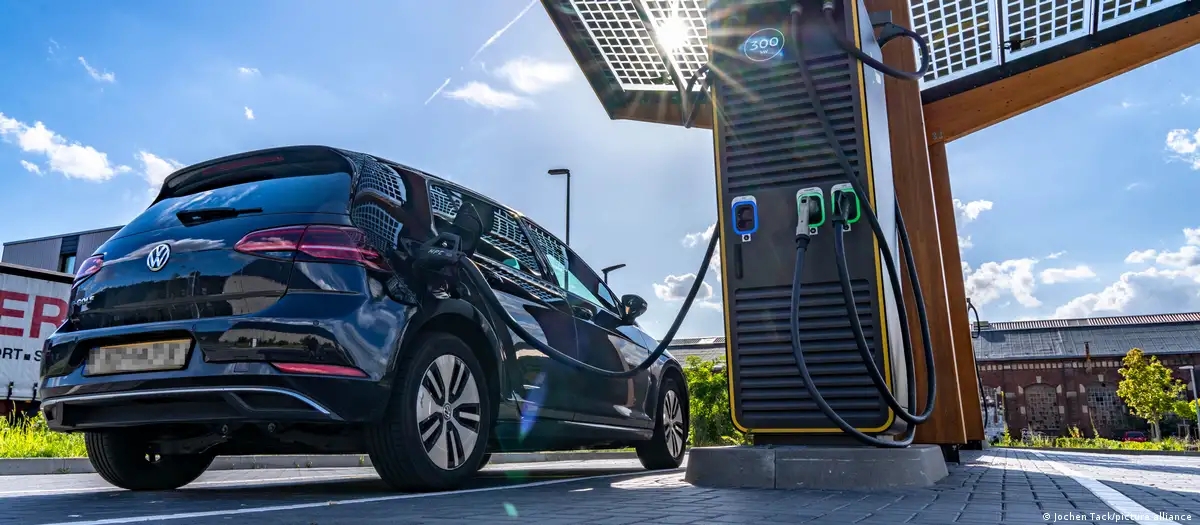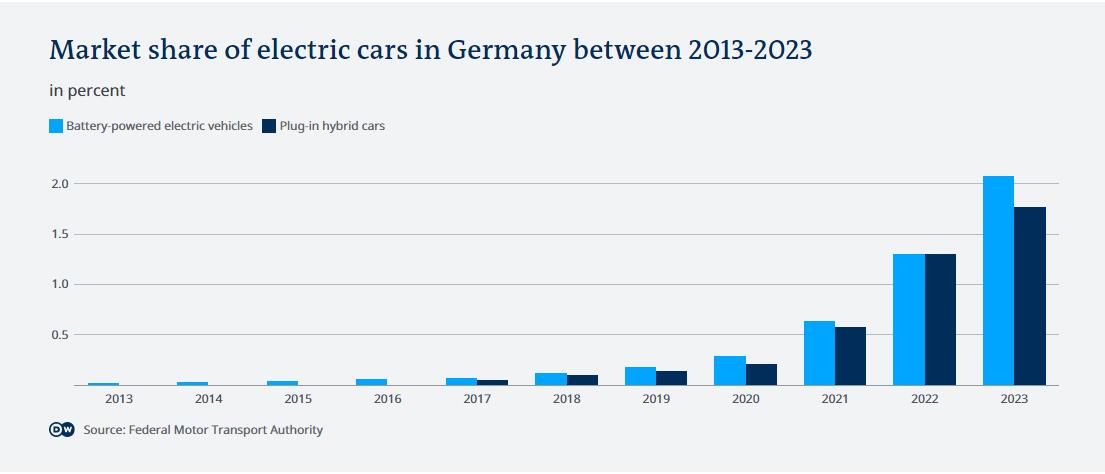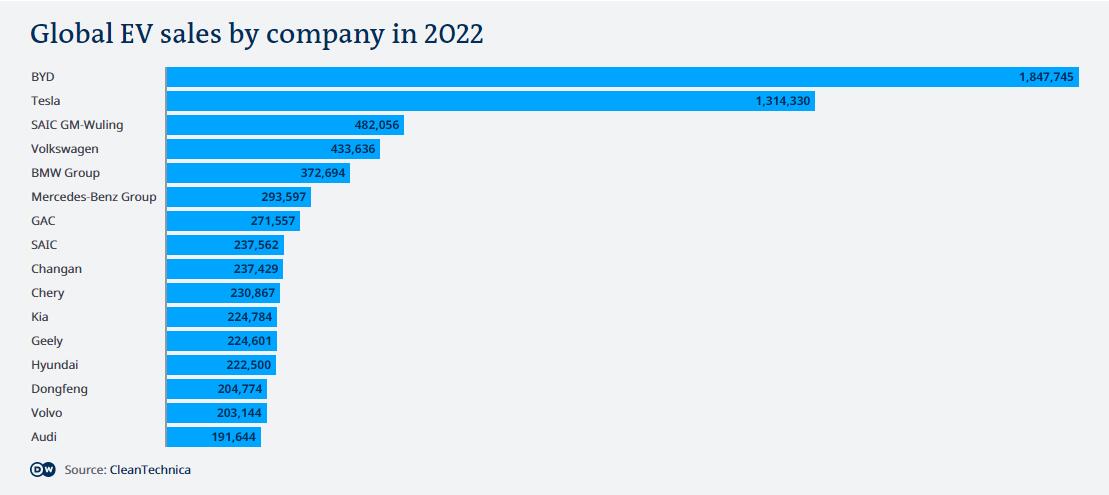
Slick ads like to portray the future of transportation as clean and quiet. They show cars that gently purr, without emitting harmful emissions, along almost empty roads through unspoiled nature, with their occupants on their way to work or to shop in clean cities without traffic jams.
The reality, of course, is somewhat different, as traffic jams, noise and the stench of exhaust fumes are, in fact, ubiquitous in Germany.
According to Germany's Federal Motor Transport Authority (KBA), the market share of electric cars in the country has grown, but it is still comparatively small. Ten years ago, they accounted for 0.02% of the total number of cars on the road; today that figure is at 2.08%. This means that every 50th car is a purely electrically powered vehicle.
You may welcome that trend or not. You may regret that almost 98% of cars are still powered by combustion engines. You may even celebrate every new electric vehicle that rolls off the assembly line, or be a proponent of driving a "real" car. Wherever you stand on the issue, the trend towards electromobility is expected to continue. The question is whether Germany's automobile industry, one of the key pillars of the economy, is prepared for the future.
Germany lagging behind others
Germany is currently not at the forefront of e-mobility. "By continuing to reduce the scrappage scheme bonuses, Economy Minister Robert Habeck has put the brake on electric cars in Germany," says Ferdinand Dudenhöffer, formerly professor of Automotive Economics at the University of Duisburg-Essen and now an independent consultant.
He estimates that the market share of electric cars in Germany will decline next year. Globally, he says, the outlook is equally bleak. "Only China will continue at full speed, and that will pay off twice and three times over for the Chinese car industry."
Due to the German Constitutional Court's recent ruling forcing the ruling coalition to make savings, the government had to discontinue the electric vehicle subsidy earlier than planned. As of December 18, it was no longer possible to apply for such subsidies for the purchase of an electric vehicle.
Stefan Bratzel, head of the Center of Automotive Management in Bergisch Gladbach near Cologne, is also pessimistic. In his view, "the race for electromobility in Germany, Europe and China is already over." Ramping up the market rapidly is key, he says. However, he cautions that the targets "set by the German government are too ambitious. They will not be achieved."
According to the government's assessment, around 15 million electric vehicles should be on the road in Germany by 2030.

'A sense of hopelessness in Germany'
Bratzel says that German car manufacturers "started too late compared to players such as Tesla or some Chinese manufacturers" and then "did not approach the topic with the necessary focus."
Notwithstanding efforts to boost battery technology development in particular, "you first have to catch up with the speed of the Chinese [companies] and Tesla," he says.
Dudenhöffer concurs that China has a clear advantage.
"We are cutting back. Investments are being postponed and investments are being made in China. The budget problems and the lack of a federal budget are exacerbating the problem," he says, adding that "Germany is at a standstill. And things will get really tough after 2025 when the Chinese will be dominating the global market for electric cars."
Dependence on China
On November 30, car manufacturers BMW and Mercedes-Benz announced plans to set up a joint network of fast-charging stations for electric vehicles in China — a logical development, says Dudenhöffer.
"Germany is not the country where such investments are worthwhile. In China, electric cars now account for a market share of almost 40%."
Bratzel also highlights the danger of too much dependence on China, although he adds that it's a two-way relationship.
"China is also dependent on us." But there is a caveat, he says. "In the field of electromobility, we are more dependent on China. That will remain the case for a few more years, especially when it comes to battery cells."
The development and production of batteries is key, says Dudenhöffer. "We are expanding more slowly. Production is going to Eastern Europe because energy is cheap there. But China is already at the forefront and its importance will continue to grow."

Germany: Decline in production
German manufacturers are already bearing the brunt of sluggish demand. The Rheiderland Zeitung newspaper recently ran a feature from the VW plant in Emden, East Frisia, revealing that electric vehicle production had already "come to a standstill in early summer. A second production shift was canceled and there were numerous production breaks. The Christmas break in production also began much earlier and was extended until January 15. EV production in Emden will be completely shut down for five weeks," the article said.
EV production requires fewer work steps and fewer employees. That applies not only to the car manufacturers but also to their suppliers. For example, up to 1,500 jobs will be lost at supplier Bosch, the company announced on December 10. The job cuts are being partly justified by a reduced need for jobs in the field of electromobility. A company spokesperson said the company would "have to adapt to demand in some areas."
Still, it's not all bad news. From a customer's point of view there is hope regarding the range provided by a battery charge, says Dudenhöffer. "A thousand kilometers are already being achieved in China today," he says.
He says that range will no longer be a problem after 2027 or 2028. "And the prices of solid-state batteries will also fall."
Looking ahead, the Federal Motor Transport Authority calculates that around 10 million EVs will be registered in Germany by January 1, 2030. Depending on the size of the current vehicle inventory, this would correspond to an EV share of 20-25%.
What the authority can't predict, however, is how many of these EVs will be produced in Germany.

Slick ads like to portray the future of transportation as clean and quiet. They show cars that gently purr, without emitting harmful emissions, along almost empty roads through unspoiled nature, with their occupants on their way to work or to shop in clean cities without traffic jams.
The reality, of course, is somewhat different, as traffic jams, noise and the stench of exhaust fumes are, in fact, ubiquitous in Germany.
According to Germany's Federal Motor Transport Authority (KBA), the market share of electric cars in the country has grown, but it is still comparatively small. Ten years ago, they accounted for 0.02% of the total number of cars on the road; today that figure is at 2.08%. This means that every 50th car is a purely electrically powered vehicle.
You may welcome that trend or not. You may regret that almost 98% of cars are still powered by combustion engines. You may even celebrate every new electric vehicle that rolls off the assembly line, or be a proponent of driving a "real" car. Wherever you stand on the issue, the trend towards electromobility is expected to continue. The question is whether Germany's automobile industry, one of the key pillars of the economy, is prepared for the future.
Germany lagging behind others
Germany is currently not at the forefront of e-mobility. "By continuing to reduce the scrappage scheme bonuses, Economy Minister Robert Habeck has put the brake on electric cars in Germany," says Ferdinand Dudenhöffer, formerly professor of Automotive Economics at the University of Duisburg-Essen and now an independent consultant.
He estimates that the market share of electric cars in Germany will decline next year. Globally, he says, the outlook is equally bleak. "Only China will continue at full speed, and that will pay off twice and three times over for the Chinese car industry."
Due to the German Constitutional Court's recent ruling forcing the ruling coalition to make savings, the government had to discontinue the electric vehicle subsidy earlier than planned. As of December 18, it was no longer possible to apply for such subsidies for the purchase of an electric vehicle.
Stefan Bratzel, head of the Center of Automotive Management in Bergisch Gladbach near Cologne, is also pessimistic. In his view, "the race for electromobility in Germany, Europe and China is already over." Ramping up the market rapidly is key, he says. However, he cautions that the targets "set by the German government are too ambitious. They will not be achieved."
According to the government's assessment, around 15 million electric vehicles should be on the road in Germany by 2030.

'A sense of hopelessness in Germany'
Bratzel says that German car manufacturers "started too late compared to players such as Tesla or some Chinese manufacturers" and then "did not approach the topic with the necessary focus."
Notwithstanding efforts to boost battery technology development in particular, "you first have to catch up with the speed of the Chinese [companies] and Tesla," he says.
Dudenhöffer concurs that China has a clear advantage.
"We are cutting back. Investments are being postponed and investments are being made in China. The budget problems and the lack of a federal budget are exacerbating the problem," he says, adding that "Germany is at a standstill. And things will get really tough after 2025 when the Chinese will be dominating the global market for electric cars."
Dependence on China
On November 30, car manufacturers BMW and Mercedes-Benz announced plans to set up a joint network of fast-charging stations for electric vehicles in China — a logical development, says Dudenhöffer.
"Germany is not the country where such investments are worthwhile. In China, electric cars now account for a market share of almost 40%."
Bratzel also highlights the danger of too much dependence on China, although he adds that it's a two-way relationship.
"China is also dependent on us." But there is a caveat, he says. "In the field of electromobility, we are more dependent on China. That will remain the case for a few more years, especially when it comes to battery cells."
The development and production of batteries is key, says Dudenhöffer. "We are expanding more slowly. Production is going to Eastern Europe because energy is cheap there. But China is already at the forefront and its importance will continue to grow."

Germany: Decline in production
German manufacturers are already bearing the brunt of sluggish demand. The Rheiderland Zeitung newspaper recently ran a feature from the VW plant in Emden, East Frisia, revealing that electric vehicle production had already "come to a standstill in early summer. A second production shift was canceled and there were numerous production breaks. The Christmas break in production also began much earlier and was extended until January 15. EV production in Emden will be completely shut down for five weeks," the article said.
EV production requires fewer work steps and fewer employees. That applies not only to the car manufacturers but also to their suppliers. For example, up to 1,500 jobs will be lost at supplier Bosch, the company announced on December 10. The job cuts are being partly justified by a reduced need for jobs in the field of electromobility. A company spokesperson said the company would "have to adapt to demand in some areas."
Still, it's not all bad news. From a customer's point of view there is hope regarding the range provided by a battery charge, says Dudenhöffer. "A thousand kilometers are already being achieved in China today," he says.
He says that range will no longer be a problem after 2027 or 2028. "And the prices of solid-state batteries will also fall."
Looking ahead, the Federal Motor Transport Authority calculates that around 10 million EVs will be registered in Germany by January 1, 2030. Depending on the size of the current vehicle inventory, this would correspond to an EV share of 20-25%.
What the authority can't predict, however, is how many of these EVs will be produced in Germany.
TEL : +86-132 6020 9406
EMAIL : lee2802@vip.126.com
WECHAT : vivianlee2802
ADD. : No.18 of Jianshe Road, Liangxiang Kaixuan Street, Fangshan District, Beijing,China

QR Code for WeChat
